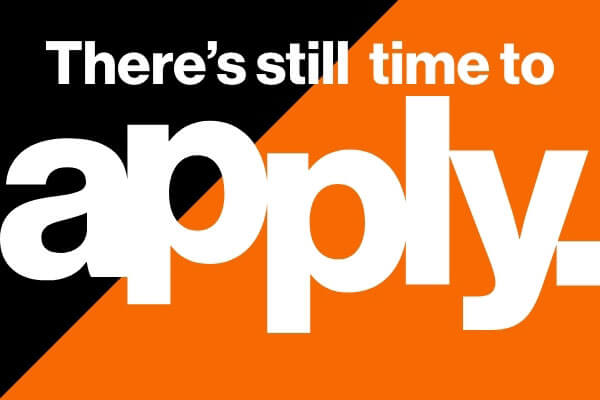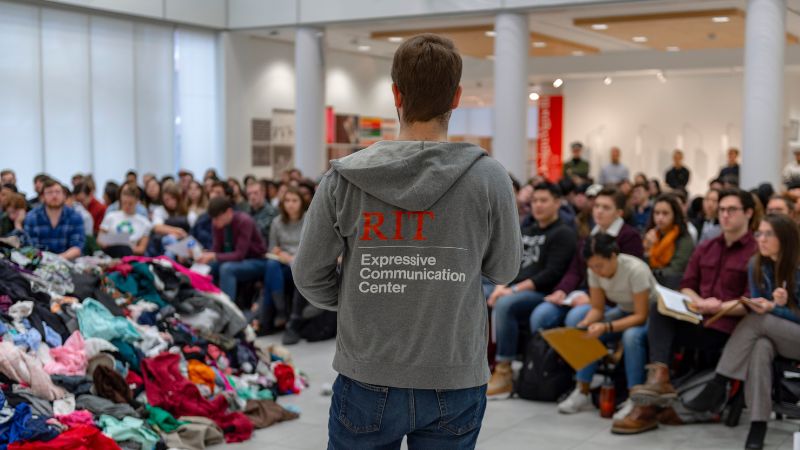Communication Bachelor of Science Degree

Communication
Bachelor of Science Degree
- RIT /
- Rochester Institute of Technology /
- Academics /
- Communication BS
Overview for Communication BS
Why Study Communication at RIT?
Build Essential Skills: Strengthen your expertise in group communication, digital media, activism and social change, health communication, journalism, and artificial intelligence and communication.
Career Readiness: Prepare for careers in corporate communication, journalism, digital content creation, nonprofit work, or advanced graduate studies.
Customize Your Degree: Broaden your communication credentials with electives in design, marketing, analytics, health care, programming, and more—a flexible, interdisciplinary skill set tailored to your goals.
Hands-On Experience: A required paid co-op gives you the opportunity to apply your classroom learning in practice before graduation.
Accelerated Pathways: Choose from MS, MBA, JD, and education partnership programs to advance your academic and career goals quickly and affordably.
RIT’s Communication BS is more than public speaking or technical writing. Instead, it prepares you for impactful careers in corporate communication, digital media, advocacy, nonprofit organizations, journalism, and other communication-driven industries.
You’ll build advanced skills through courses in group communication, digital content strategy and production, activism and social change, health communication, and journalism.
How Can You Customize Your Education for Your Career Goals?
RIT’s communication BS allows you to design a curriculum to suit your career goals. Tapping into RIT’s exceptionally diverse range of electives, minors, and immersions, you can develop expertise in design, management, marketing, or computing—getting valuable breadth while also developing depth in core communication expertise. Examples include:
- Corporate Communication: Prepare for roles in corporate communication and management by combining courses in small group dynamics, public relations, organizational communication, and leadership.
- Health Communication: Study how health campaigns, communication strategies, social media, and advertising shape public understanding of health issues, as well as communication in the healthcare setting. This path leads to opportunities to work in healthcare organizations, nonprofits, and advocacy groups. Read about the RIT health communication minor.
- Nonprofit, Activism, and Social Change: Learn how communication drives advocacy and civic engagement through courses in communication for social change, visual activism, public relations, and public policy—ideal for nonprofit and socially driven careers.
- Communication Studies: Build a strong theoretical and analytical foundation by choosing courses such as intercultural communication, interpersonal communication, visual communication, rhetoric of race relations, media and gender, and communication theory and methods. This path prepares you for graduate studies or careers in multicultural organizations, education, political communication, or social services.
- Journalism: Choose the communication BS - journalism option to build skills in news writing, multimedia storytelling, and digital content creation for careers in reporting, editing, and digital media production. You’ll learn to gather information, write with clarity and impact, and integrate verbal and visual elements to communicate news stories and digital content across diverse media channels.
Fast Track Options for Advanced Degrees
RIT Accelerated Combined Bachelor’s/Master's Degrees
Today’s careers require advanced degrees grounded in real-world experience. RIT’s Combined Accelerated Bachelor’s/Master’s Degrees enable you to earn both a bachelor’s and a master’s degree in as little as five years of study, all while gaining the valuable hands-on experience that comes from co-ops, internships, research, study abroad, and more.
- Communication BS/Communication MS: Level up your communication expertise by earning both a bachelor’s and a master’s degree in the field. As a graduate student of communication, you will delve deeper, focusing research and study to develop career-boosting expertise in areas such as AI use in communication, social media, visual communication, health communication, and civic engagement.
- Communication BS/Sustainable Systems MS: By combining communication studies with sustainability, you’ll be equipped to address issues such as environmental justice, community resilience, and sustainable development—preparing you for impactful careers in policy, advocacy, corporate sustainability, and international development.
- +1 MBA: Students who enroll in a qualifying undergraduate degree have the opportunity to add an MBA to their bachelor’s degree after their first year of study, depending on their program. Learn more about the +1 MBA.
A Foundation for a Career in Law
The RIT College of Liberal Arts offers two options for students whose ultimate goal is a career in law: the Pre-Law program and the 3+3 Law program. Beginning with a bachelor’s degree in communication can build skills like public speaking, strategic planning, and critical thinking that transfer well and provide a solid foundation for a legal career.
- Pre-Law Program: RIT’s pre-law program will help you navigate the admission process for law school, prepare for your LSAT, explore a range of legal careers, and guide you through course selections to bolster your success in competitive law school applications. The program is open to students in all majors.
- 3+3 Law: A fast track to law degree, this option lets you earn a bachelor’s degree at RIT and a Juris Doctorate degree at either Syracuse University’s College of Law or University at Buffalo School of Law. Interested students may apply to the option directly, with successful applicants offered admission to RIT and conditional acceptance into either Syracuse University’s College of Law or University at Buffalo School of Law.
Teaching Partnership Programs
RIT's communication degree is eligible for RIT’s Teaching Partnership Programs, 4+1 options for earning your bachelor’s degree at RIT, and a master’s degree in education at a partner university.
Whether your goal is to go into early childhood or elementary education, become a secondary education teacher with a content area specialty at the middle or high school level, or work in higher education, these programs with local universities provide a guided pathway. As you progress, you’ll benefit from focused academic advising, career exploration opportunities, and RIT resources for research, learning, and skill development.
Learn more about RIT’s Teaching Partnership Programs.
Advising
Professional advisors support you with course planning and registration. Faculty mentors guide your career development, help you identify research opportunities, and prepare you for graduate study or professional pathways, and your RIT Career Coordinator is here to help.
Learn more about Resources for Success for RIT College of Liberal Arts students.
Learn more about Academic Advising for RIT College of Liberal Arts students.
Learn more about your Career Coordinator and other Career Launching Support and Experiences for RIT College of Liberal Arts students.
-
Join Us for Accepted Student Open House
Visit campus on March 28 or April 11 to meet faculty, tour campus, and ask your questions.
-
Join us for Fall 2026
There's still time to apply. For some programs, applications will be reviewed on a rolling, space-available basis.
Careers and Cooperative Education
What Can You Do with a Degree in Communication?
Highly skilled communicators are needed in nearly every industry imaginable from corporate, health care, tech, entertainment, or media to government, policy making, and non-profit. Employers value the strong digital skills, professional experiences developed through internships or co-ops, and an adaptable, growth mindset that RIT graduates bring.
Typical Job Titles
| Social Media Manager | Corporate Communications Specialist | Content Writer |
| Digital Media Specialist | Community Relations Specialist | Event Coordinator |
| Brand Strategist | Customer Success Manager | Journalist |
| Podcast Producer | Marketing Communications Manager | Fundraising Coordinator |
| Nonprofit Communications Manager | Campaign Manager | Speechwriter |
| Crisis Communications Specialist |
Industries
-
Advertising, PR, and Marketing
-
Higher Education
-
Movies, TV, and Music
-
Health Care
-
Journalism, Media, and Publishing
-
Manufacturing
-
Non-Profit
-
Internet and Software
Cooperative Education
Students majoring in communication at RIT are required to complete at least one cooperative education experience, tapping into RIT’s co-op and internship program that is ranked 5th in the nation by U.S. News and World Report.
A College of Liberal Arts co-op provides hands-on experience that enables you to apply your knowledge in professional settings while you make valuable connections between course work and real-world applications. You’ll gain real-world career experience that sets you apart as well as exposure–early and often–to a variety of professional work environments, career paths, job roles, and industries.
Featured Work and Profiles
-
Four Years and a Full Experience: From career-launching co-ops to clubs and research, this 2025 grad made the most of every moment at RIT
Hailey Fowler began at RIT like so many other first-year college students, slightly shy but super psyched to begin her college journey. At RIT, she soon connected with experiences that gave her an...
Read More about Four Years and a Full Experience: From career-launching co-ops to clubs and research, this 2025 grad made the most of every moment at RIT -
RIT Alumna Thrives in Real Estate Law at Prestigious NYC Firm
After passing the New York state bar exam, Shakierah Smith became a real estate associate at Fried, Frank, Harris, Shriver & Jacobson, a law firm in New York known nationally for its...
Read More about RIT Alumna Thrives in Real Estate Law at Prestigious NYC Firm
Curriculum for 2025-2026 for Communication BS
Current Students: See Curriculum Requirements
Admissions and Financial Aid
First-Year Admission
First-year applicants are expected to demonstrate a strong academic background that includes:
- 4 years of English with a strong performance is expected.
- 3 years of social studies and/or history with a strong performance is expected.
- 3 years of math is required and must include algebra, geometry, and algebra 2/trigonometry.
- 2-3 years of science.
Transfer Admission
Transfer applicants should meet these minimum degree-specific requirements:
- A minimum of college algebra is required.
Financial Aid and Scholarships
100% of all incoming first-year and transfer students receive aid.
RIT’s personalized and comprehensive financial aid program includes scholarships, grants, loans, and campus employment programs. When all these are put to work, your actual cost may be much lower than the published estimated cost of attendance.
Learn more about financial aid and scholarships
Accreditation
Related News
-
December 19, 2025

Communication Students Serve as Conference Media Team
Students from RIT’s School of Communication served as the official media team for the New York State School Counselors Association conference, held last month at the Rochester Riverside Convention Center.
-
December 12, 2025

U.S. State Department changes official font from Calibri back to Times New Roman
NPR speaks to Kristen Shinohara, associate professor in the School of Information, about why fonts matter.
-
November 12, 2025

Communication grad connects the globe
As the CEO of Pacific Telecommunications Council, Brian Moon '00 (communication) is proud to help foster community in an industry that makes a tangible impact.
Contact
- Heather Roth
- Assistant Director of Recruitment and Retention Outreach
- Dean’s Office
- College of Liberal Arts
- 585‑475‑5456
- hmrgla@rit.edu
School of Communication

















